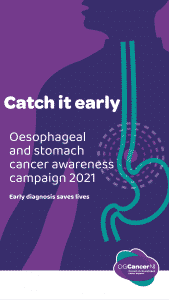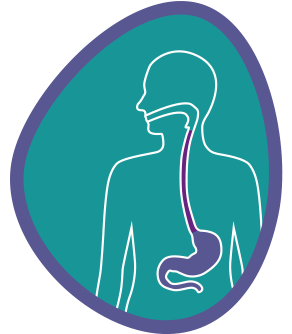What To Do If You Think A Loved One Might Have Oesophageal Cancer
Everyone knows that, when it comes to cancer, early diagnosis is vital for survival rates.
The standard advice from healthcare professionals is that you should see your doctor if you notice a change that isn’t normal for you, or if you have any of the possible signs and symptoms of cancer.
But what happens if you think you spot the signs of a particular cancer in a loved one or in a friend and they haven’t mentioned it, or have mentioned it but haven’t taken any action to deal with it?
This is especially important if you already know that the person has a family history of cancer or has previously had cancer.
Symptoms
When it comes to spotting the signs of oesophageal cancer – particularly in a loved one – the problem is that the symptoms are often easily mistaken for other, less serious conditions.
They may remark – or may notice – for example, that they suffer from persistent heartburn or acid reflux and are constantly taking antacids.
Or, you may have noticed that they have a persistent cough or hoarseness, persistent hiccups or persistent nausea.
They may complain of swallowing difficulties or of pain or discomfort as food passes down their oesophagus, or you may notice that they are losing weight (without trying to) and are unusually tired.
Who is likely to get oesophageal cancer?
While ANYONE can get oesophageal cancer, your loved one is more likely to get it if they:
- Are over the age of 60
- Are male
- Have certain medical conditions, such as long-term, severe acid reflux or gastro-oesophageal reflux disease (GORD), or a condition called Barrett’s oesophagus, which is a condition in which tissues that is similar to the lining of the intestine replaces the tissue lining the oesophagus. People who have Barrett’s oesophagus are more likely to develop a type of cancer called oesophageal adenocarcinoma.
When to signpost a loved one to a GP
Where you need to have a serious conversation with a loved one, however, is if the symptoms begin to occur more frequently or are more serious in nature. If, for example, they begin to choke more frequently as they’re eating, or if they’re regularly regurgitating their food, or having increased difficulty in swallowing.
Persuading them to see a GP
There’s no doubt that the word ‘cancer’ strikes fear in everyone. No matter how much medicine has improved over the years, cancer remains the one disease that can still prove incurable. For that reason, many people will ignore the symptoms and will choose to remain in denial even if they know that the symptoms they’re experiencing are not ‘normal’ for them.
If you see that a loved one is experiencing any of the symptoms above, or if they have expressed any concern about experiencing such symptoms, the first thing you need to do is provide reassurance that the best course of action is to act quickly. Reinforce the fact that, with cancer, early diagnosis will lead to the best outcomes.
Don’t dismiss their fears. They’re perfectly normal. But provide reassurance and gently persuade them to make an appointment with the GP as a first step. Reassure them that you’ll be with them every step of the way.
Remind them that, even if they’re worried about what the symptoms might be, they shouldn’t delay seeing the GP. Their concerns are not going to go away if they don’t make an appointment.
Remind them that the symptoms might not even be due to cancer, but, if they are, then the earlier it is picked up, the higher the chance of successful treatment.
Some patients worry that they’re wasting their doctor’s time, so, again, reassure them that that’s what the GP is there for – to provide reassurance that there is no illness present, or to deal with it if there is. Doing nothing is not an option.
Attend the appointment with your loved one
Once they do make an appointment with the GP, then tell them you’ll accompany them to it. This will not only give them some comfort that they won’t be alone, but will ensure that, in the event that they are extremely anxious, you’ll be in a position to provide the GP with all details of symptoms etc and can, if necessary, make notes.
It’s a good idea to write down their symptoms, including when they started, when they happen and how often your loved one has them.
List anything that makes the symptoms worse or better.
Ask the GP to explain anything that you or your loved one doesn’t understand.
Tests the GP may do at the appointment
At the appointment, the GP may carry out general tests including blood tests to ascertain your loved one’s overall general health and will check for signs of cancer, such as lumps.
Your GP may initially give your loved one a medication to see if that solves their symptoms.
If, after two to three weeks, the symptoms have not gone away, the GP may refer them for an endoscopy. This is a camera which is passed down their oesophagus (with sedation if they prefer) where the endoscopist can have a look at the lining of the oesophagus and the stomach. They may take biopsies if they are unhappy about anything they see. This does not necessarily mean your loved one has cancer.
Depending on your GPs assessment they may also refer you for a CT Scan and/or a barium swallow which is a type of X-ray that allows the doctor to look at the back of your mouth and throat and oesophagus.
When it comes to suspecting that a loved one might have oesophageal cancer, the most important thing is to encourage them to act quickly.

